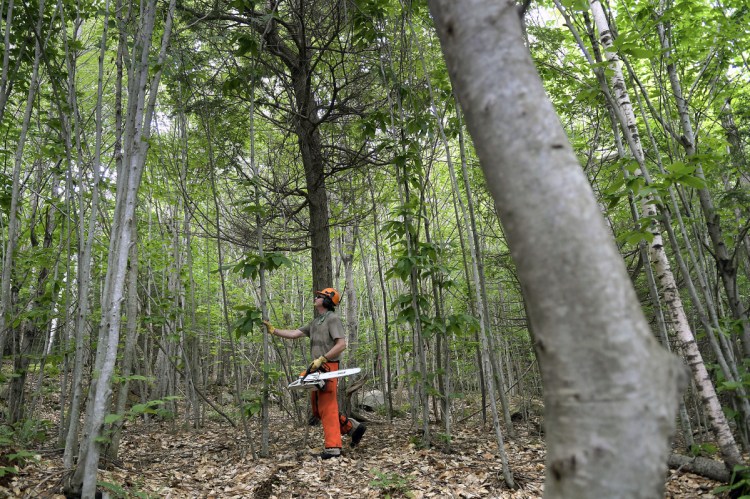AUGUSTA — Volunteer Stephen Condon and Kennebec Land Trust interns Jack Daley and Jordan Tanguay followed on the heels of Jean-Luc Theriault who, wielding a chain saw, left a trail of branches behind for them to collect and throw into the woods away from the newly blazed trail as he made his way up Howard Hill.
The four, and a slew of other volunteers, are working to establish new trails on the 164-acre city-owned property, improve public access and remove invasive plant species.
A plan for the land envisions it as a “historic forest park” with parking available for people to access it near the State House complex, Ganneston Drive in Augusta and on the Stevens Common property in Hallowell. It includes the creation of several miles of recreational trails and some clearing of trees which organizers said will provide expansive views of the state Capitol and the river valley.
Ashley Sawyer, a member of the Augusta Conservation Commission who is serving as a steward of Howard Hill, said so far 35 people have volunteered to help ready the land to be converted from its current state to more of a formal park with marked trails and improved access. Of those, 10 people are already working on preliminary trail work.
On a recent day Theriault, stewardship director for Winthrop-based Kennebec Land Trust, which turned the property over to the city last year, followed a trail of orange and pink strips of plastic he and Sawyer had previously tied to trees. Sawyer said three loop trails have been tagged on the top of the hill and they hope to make another that goes along the top of the cliffs and then back down to the bottom.

Kennebec Land Trust intern Jordan Tanguay walks Wednesday through a glade on Howard Hill in Augusta while searching for invasive species.
Leif Dahlin, the city’s community services director, said it’ll probably take a year or two of work before the park can be opened to the public.
“Howard Hill is a work in progress and it’s going to take time to properly manage this marvelous asset,” Dahlin said.
He said a critical piece will be providing public access and parking for the site. He said the parking lot will have to be designed, permitted and also funded but no cost estimates have been done yet. He noted initial engineering work could be paid for with part of $100,000 in stewardship funds the land trust gave to the city when it turned the land over. He and Sawyer said Howard Hill advocates are expected to hold fundraisers to garner funds so the park will not require funding from city taxpayers.
Work planned to help conserve the property involves the removal of invasive species, which Theriault said hampers the healthy biodiversity of the land.
Following a plan laid out by officials of the Maine Natural Areas Program, volunteers are working to remove invasive plants like multiflora rose, Japanese barberry, Asiatic bittersweet, and Autumn olive, from selected areas of the proposed parkland.
“Hopefully taking the roots out prevents them from coming back, but, with seeds and everything, some of it will come back,” Tanguay said. “It’s a constant battle. That’s what management is.”
Daley said after pulling the plants up, they are hung upside down, to further decrease the chances they’ll regrow.
Tanguay is also conducting research on ticks on the property as part of her internship with the land trust.
She said her project, in which she collects a variety of ticks and tests them for diseases, is meant to figure out the density of ticks and what varieties are most common on Howard Hill. She said that information will likely be used to provide educational materials for park users.

Kennebec Land Trust volunteer Stephen Condon clears fir limbs Wednesday from a trail being cut on Howard Hill in Augusta.
The property once was owned by William Howard Gannett, who in the 1890s bought some 450 acres including Howard Hill – where he created Ganneston Park. The park included gardens, ponds, carriage paths and trails.
The plan for the land comes after years of repeated doubt from Gov. Paul LePage about its value.
The city was given the land last year by Kennebec Land Trust, which bought the property that provides a largely undeveloped backdrop to the Maine State House, from local attorney Sumner Lipman in 2015.
The land trust purchased the property — named for the family of Capt. James Howard, one of the founders of Augusta — for about $925,000, even though its city appraisal for tax purposes was $171,000. The land trust raised money to pay for the project, and it used $163,500 in Land for Maine’s Future money to help fund the purchase. The Land for Maine’s Future funding was reduced to that amount, from the previously proposed amount of $337,500, following criticism of the acquisition by LePage, who also had withheld voter-approved conservation bonds for the project temporarily.
Keith Edwards can be contacted at 621-5647 or at:
kedwards@centralmaine.com
Twitter: kedwardskj
Send questions/comments to the editors.





Success. Please wait for the page to reload. If the page does not reload within 5 seconds, please refresh the page.
Enter your email and password to access comments.
Hi, to comment on stories you must . This profile is in addition to your subscription and website login.
Already have a commenting profile? .
Invalid username/password.
Please check your email to confirm and complete your registration.
Only subscribers are eligible to post comments. Please subscribe or login first for digital access. Here’s why.
Use the form below to reset your password. When you've submitted your account email, we will send an email with a reset code.